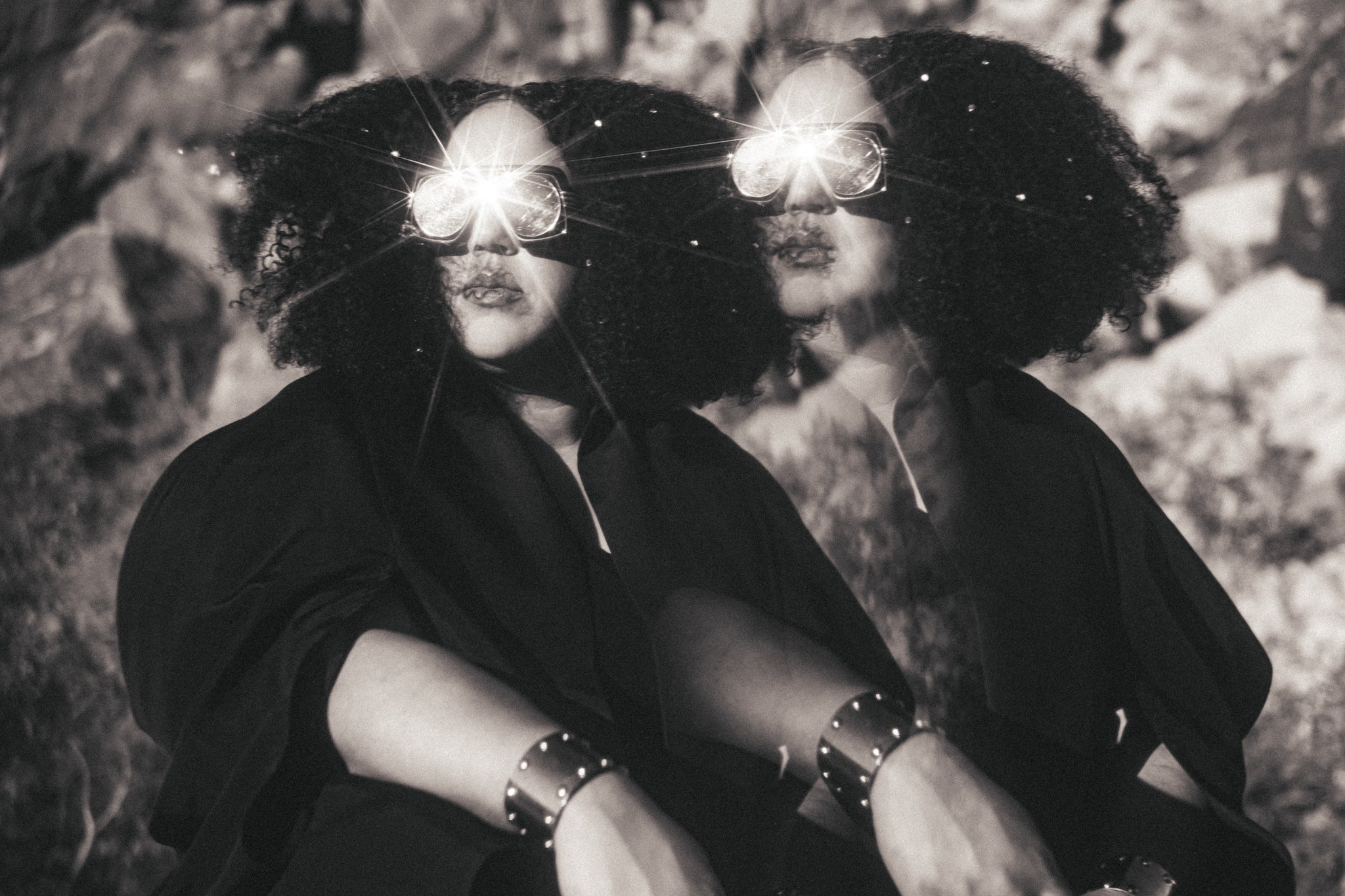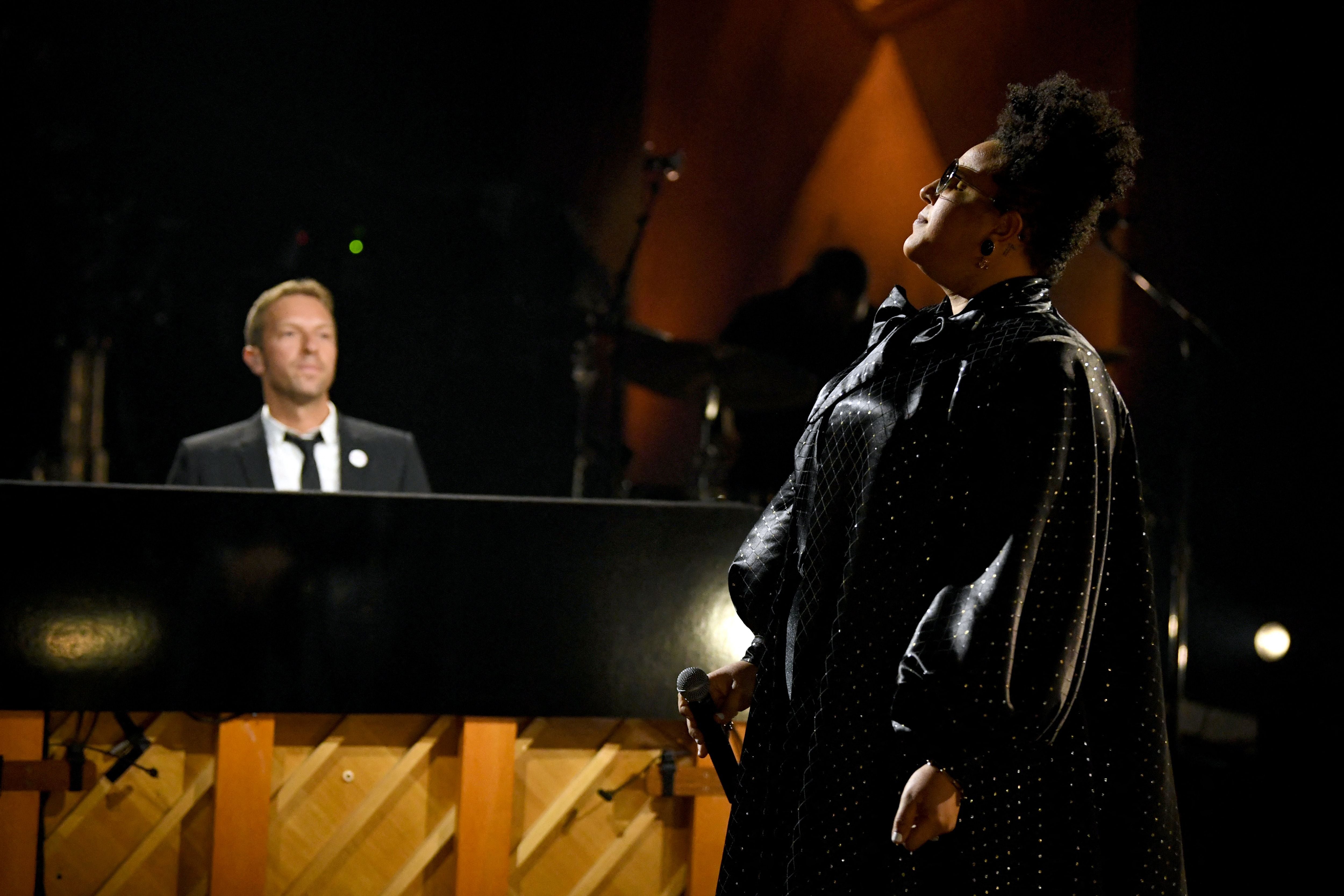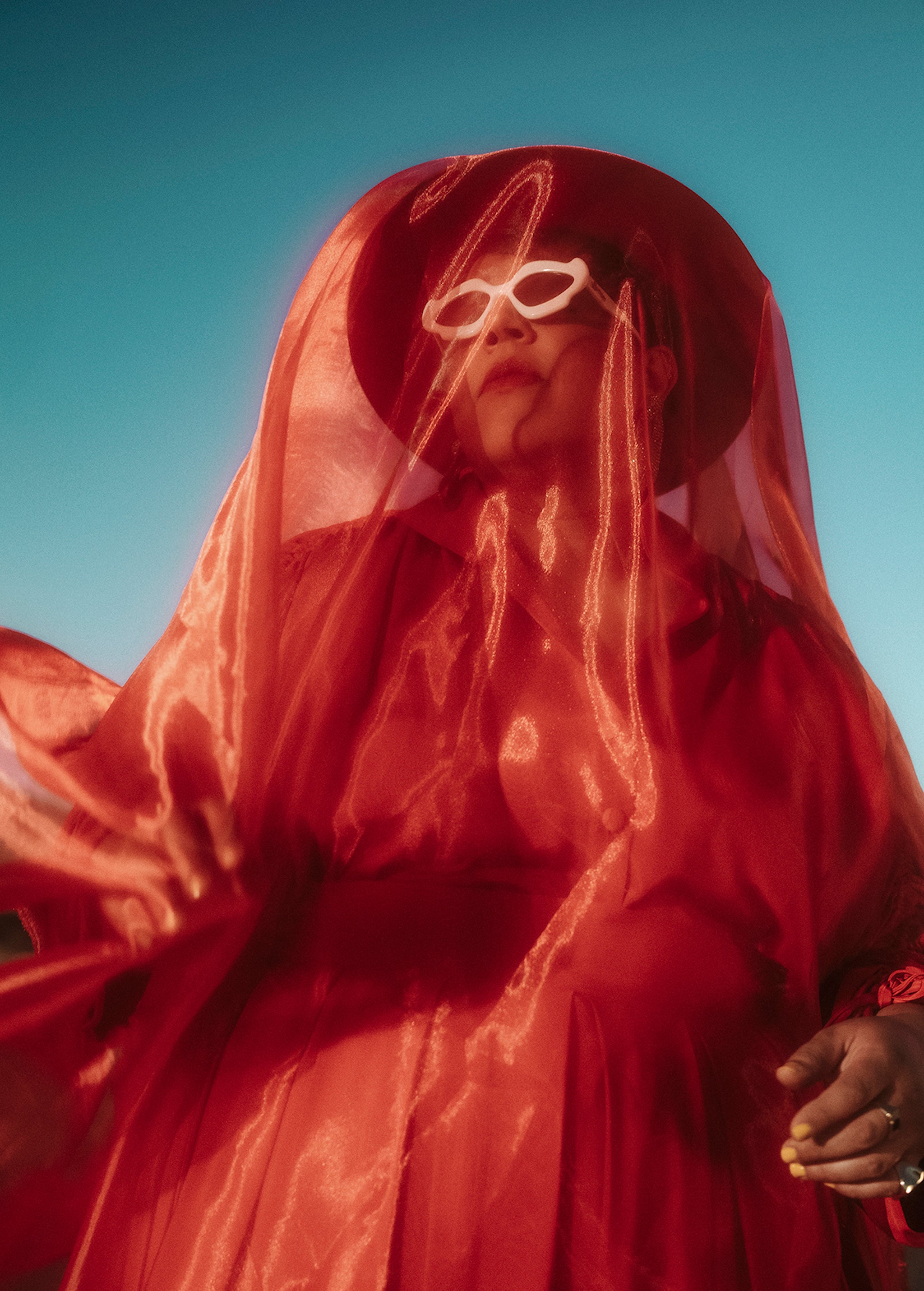Brittany Howard on grief, heartbreak, and life in Alabama: ‘I didn’t believe in any higher power anymore’
The former Alabama Shakes vocalist is two albums deep into a monumental solo career. Speaking to Stevie Chick from sunny Nashville, the Grammy-winner reflects on making her spectacular second album, overcoming her recent break-up, and why she’ll never move away from the South – no matter how tough it gets

People say I seem really confident, but they don’t understand what I’ve been through,” says Brittany Howard. “I’m like a piece of hot metal that’s been strengthened by being thrust into cold water. I’ve been tempered by life.”
It’s a hazy morning in Nashville, Tennessee, where Howard, 31, is video-calling from her porch, accompanied by her amiable menagerie of cats and dogs. Warm, open, and supremely comfortable in her own skin, the five-time Grammy winner certainly does seem confident. Her new album What Now is similarly bold – an eclectic, ambitious set that, like all great soul music, transforms heartache and agony into magic and joy.
It’s an alchemy she has been perfecting for years, most notably as the lead vocalist of the rock band Alabama Shakes, but really, it’s been an ongoing project since she was 11, watching friends play Nirvana covers in her school gym. “It seemed like this really cool secret, that these kids I knew were actually musicians,” she remembers. “I looked at my peers, dancing and so excited. I saw everyone in a new way. And I knew, this was it. This was what I wanted to do.”
The 11-year-old Howard was in need of a dream. A couple of years earlier, she and her older sister Jaime developed a rare cancer, retinoblastoma. Howard was left partially blind in one eye. Jaime, however, died when Brittany was eight. The family were engulfed by grief; Howard’s parents would later divorce. In the immediate aftermath of Jaime’s death, the family stopped attending church, “because my mom and dad were grieving, and they didn’t want to grieve in a group. I was pretty happy about not going to church, honestly. I didn’t believe in any higher power anymore, just human beings”.
Jaime had been Howard’s playmate; she’d taught her to play the piano. And she was also the only other kid in their mostly white hometown who understood what life was like as the daughter of a Black father and a white mother in Athens, Alabama. “In our community, that was highly unusual,” Howard says. “It was so unusual that when she was pregnant my mother wasn’t sure what colour we would be, because she had never seen a ‘mixed’ child before. People would just come up to her and say terrible things about us, and what she’d ‘done’.”
Athens bred in Howard a sense of otherness that would ultimately prove the making of her. “I just came out of the womb different,” she reasons. “I was a late bloomer; I was tall; I had kinky, curly hair, and no one else I knew did. It all just made me really resilient.” That resilience served her well as she searched for bandmates among her school friends. “I taught myself instruments so I could then teach guitar or bass to any kid who had any interest in maybe playing with me,” she recalls. Few stuck it out for long, but Howard persisted. “I did it for so long that by the time I actually had people around me that were interested in the craft of songwriting and learning to get better at their instruments, I was just waiting for them to stop showing up to practice.”
Those who did keep showing up included guitarist Heath Fogg and bassist Zac Cockrell; the trio continued making music together after they graduated school, picking up drummer Steve Johnson along the way. “We were nerds,” Howard laughs. “We loved music, the history behind it. None of us were formally educated, so everything was a discovery to us.”
While each brought different influences to the table, they shared a passion for Sixties R&B and garage-rock. They named themselves the Shakes (the Alabama designation would follow later) and developed a setlist of covers and raw originals that they played at every bar and house party that would host them. “We didn’t have any grand designs,” Howard says. “We often got paid nothing when we played. We didn’t have anyone representing us. It was me, putting our music up on the internet, trying to make good choices. I never thought it was going to happen.”

But then one track – a slow-burner, “You Ain’t Alone”, freighted with all the vulnerability, dignity, and power of a lost Otis Redding ballad – caught the ear of Justin Gage, founder of influential online music magazine Aquarium Drunkard. Sharing the tune on his site in July 2011, he described the Shakes as “a slice of ‘the real’”. Within days, Howard was fielding offers to manage or sign the band, beginning their dizzyingly brisk journey from obscurity to the big time. Within a year, they’d released their debut album, 2012’s Boys & Girls, picking up three Grammy nominations and selling a million copies in the US alone.
“It happened so quickly, I couldn’t really believe it,” Howard says. “I’d never been out of the south before, but suddenly I found myself in London, and then Paris…” She remembers seeing herself “all dolled-up” on Saturday Night Live and thinking “it felt like a different person. I’d never had that sort of attention in my life, or had to deal with people I didn’t know having opinions of me”. It felt good, she says, “having made something of my life, but I needed to preserve my world. I didn’t need a big ego, I didn’t need a deflated ego. I just wanted to stay who I am”.
She pauses, takes a breath, and her ginger tom leaps up onto the table and peers into the laptop camera. She scoops him up into her arms and pulls him back into her lap. “His name is Bobby Brown, because everything is his prerogative,” she laughs. In moments like these, it’s clear stardom hasn’t much changed Howard. The clarity of her answers is softened by her southern burr and regular sidebars of laughter. “I will never lie to you,” she says at one point, and though that’s a phrase loved by con artists, it’s crystal clear Howard is telling the truth.

The Shakes’ second album, 2015’s Sound & Color, won the group three more Grammys and a throng of new fans, including Drake, Beyonce, Paul McCartney, and the Obamas. But within three years, the Alabama Shakes were on ice. Howard set her eyes on a new challenge: a solo career. “I just wanted to expand creatively without anyone else’s input,” she remembers. “It was daunting. But I thought, ‘What if I just erased the borders I work within in the Shakes? What if anything goes?’”
Within their garage-rock milieu, the Shakes had translated grit into gold. But the boldness of Howard’s debut solo album, 2019’s Jaime, gave rise to a moment not unlike the one in The Wizard of Oz when Dorothy’s world transitions from monochrome to technicolour. It broadened her palette to encompass bristling funk, delirious psychedelic-soul, wild avant-jazz protest.
I wanted Jaime’s name to be something that didn’t elicit tragedy, especially for my family. I wanted it to be something very positive
The lyrics, meanwhile, found Howard sharing parts of herself she hid during the Shakes era. The stinging “Goat Head” recounted an episode when racists slashed the tires of her father’s truck and left a severed goat’s head on the back seat. “He Loves Me” – a river-deep funk in praise of a higher power that loves her without judgement “when I’m smoking blunts… when I’m drinking too much” – chronicled the evolving journey of her spirituality.
“Georgia”, meanwhile, is a sublime hymn of love from one woman to another. Howard had come out several years earlier, a decision she made after “visiting Nashville and meeting people with different lives, who loved themselves and were happy with themselves, which made me take a deeper look inside myself and figure out why I wasn’t happy”. That was another journey, she says.

The title of Jaime only underscored her solo debut’s personal nature. “I liked seeing our names together on something that I made,” she explains. “Because Jaime taught me about music, she taught me about art, and we’d sing together and make up songs. So, it only seemed appropriate to honour her that way. And I wanted her name to be something that didn’t elicit tragedy, especially for my family. I wanted it to be something very positive.”
The acclaim, not to mention the seven Grammy nominations, Jaime enjoyed only emboldened Howard on its follow-up. What Now is even more ambitious, switching between dreamy doo-wop (“I Don’t”), ecstatic house (“Prove It To You”) and regret-soaked chanson (“Samson”). The eclecticism is never forced or for its own sake; like her heroes before her, Howard contains multitudes, and is sharing her whole creative self. “Prince, David Bowie, Bjork… they could take any direction at any moment, and everybody would be like, ‘OK,’” she explains. “They always were true to themselves. Their music didn’t deal in genre or tradition, it gave us the person themselves – their depth, their individuality.”
What Now expands upon the confessional tone of the previous album, its songs mostly recounting the end of a relationship (Howard split from her wife, musician Jesse Lafser, in the years between Jaime and What Now). The lyrics chart complicated moral and emotional terrain, peaking with “Samson”, on which the narrator is caught in that transitional space between being in love and being out of it, all the while knowing they must break away and move on.

“It’s such a difficult decision, to hurt someone, so that you can be authentic to yourself,” Howard says. “It’s the worst space to be in, just endlessly running through the best-case scenarios for all parties and ignoring what you really want, because you want to protect everybody’s feelings. I had to write about it. These songs are about being a good, sensitive, loving person who hurts because love hurts. I’m not the hero, and I’m not the victim. Singing about it is cathartic, it’s healing stuff.”
The album’s sole moment of release from the anguish comes with “Another Day”. Preceded by a snippet of wisdom from the late poet Maya Angelou, the song imagines a world without judgement or prejudice. Its hopeful tenor feels at odds with America’s current political turmoil. “It’s like trash TV, isn’t it?” she scowls.
I love living here... And this is my home. I was born here. And I have as much right to steer the direction of this land as anyone else
“It’s actually hard for me to think about it. Because it does not have to be like this.” She sighs. “A change is gonna come the way a change is gonna come, to be honest with you. It’s hard to see so much injustice happening in the name of the American dollar. But I do have high hopes. I do. Like Maya Angelou said, as destructive as human beings can be, there’s always creativity, building bridges to each other, being hopeful for new things. I can’t create from a place of absolute, abject terror. So, I’m writing songs like ‘Another Day’ for myself, to keep my head up, so I can fight on.”
Howard is no quitter. You can tell by how she speaks about her Deep South homeland, the home she won’t give up on, no matter how much it hurt her in the past. She remains that same piece of hot metal, resilient, tempered by her journeys, and growing stronger with every trial she withstands.
“I love living here,” she says. “I’ve tried to move away a few times, but I’m an outdoors-y person, and there’s a lot of outdoors here. I love the warmth of the people here too much. And I think progress needs a helping hand, y’know? Not all of us can abandon ship. And this is my home. I was born here. And I have as much right to steer the direction of this land as anyone else. I’m not going anywhere.”
‘What Now’ is out on 9 February via Island Records
Join our commenting forum
Join thought-provoking conversations, follow other Independent readers and see their replies
Comments
Bookmark popover
Removed from bookmarks